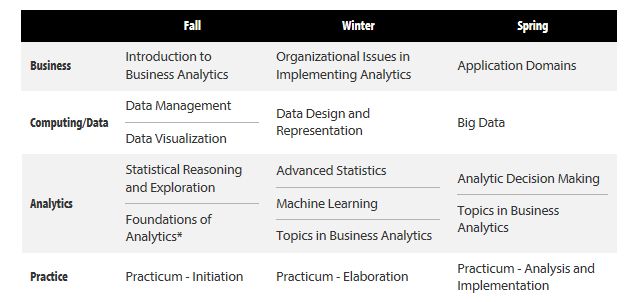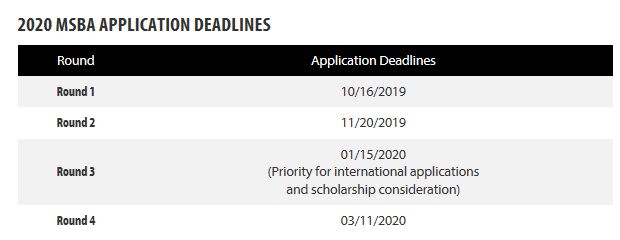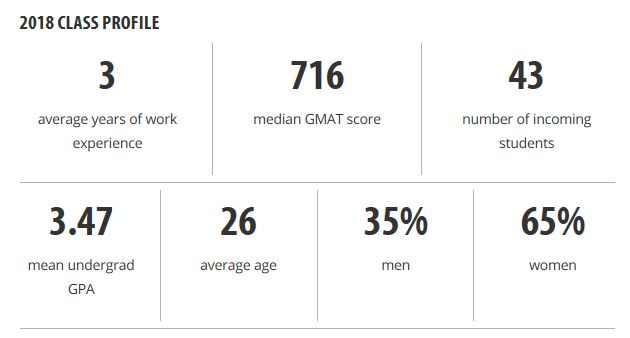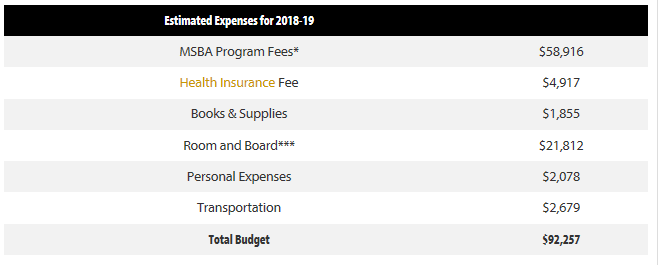Master of Science in Business Analytics
Full time/10-Month/ STEM program
Graduate School of Management
Programme Description
Blends data science skills with business knowledge and organizational savvy.
将数据科学技能与业务知识和组织能力融为一体。
Recognizes and leverages the importance of a diverse set of skills in analytics work, by admitting students based on leadership in a salient skill set (quantitative analysis, computing, business experience or organizational effectiveness) and bringing them together in teams with leaders who have complementary strengths.
认识到并利用分析工作中各种技能的重要性,在突出的技能集中(定量分析、计算、商业经验或组织有效性)招收基于领导力的学生,并将他们召集到团队中,与具有补充力量。
Emphasizes learning-by-doing and teamwork through a live analytics project with a corporate sponsor and faculty mentors. Integrated with your studies, the project scope runs from opportunity identification, to problem structuring, to solution, persuasion and implementation.
强调通过与公司赞助人和教员导师一起的实时分析项目进行干中学和团队合作。与您的研究相结合,项目范围从机会识别、问题结构、解决方案、说服和实施。
Inspires learning from student peers with backgrounds in analytics and humanistic disciplines, graduates and mid-career professionals, from the U.S. and abroad.
激发来自美国和国外具有分析和人文学科背景的学生同行、毕业生和职业中期专业人士的学习。
Core Competencies
核心竞争力
Business 商业
Build your business skills for achieving organizational impact through leadership, strategic thinking, communication and project management.
通过领导力、战略思维、沟通和项目管理,培养您的业务技能,以实现组织影响力。
Data 数据
Build your data skills as you learn core methods for acquiring, storing, handling and representing data.
在学习获取、存储、处理和表示数据的核心方法时,培养数据技能。
Analytics
Analytics is the discovery, interpretation and communication of meaningful patterns of data. Build your skills in core statistical and computational techniques such as data modeling, databases, regression, data mining, machine learning and operations research methods.
分析是发现、解释和交流有意义的数据模式。培养你的核心统计和计算技术技能,如数据建模、数据库、回归、数据挖掘、机器学习和运筹学方法。
Practice
Our program will give you hands-on experience working with and implementing analytic projects in a business environment. Under the direction of program faculty and in small student teams, you will learn analytics by navigating the complete project lifecycle on business problems drawn from real industry data.
我们的项目将为您提供在商业环境中处理和实施分析项目的实践经验。在项目教员和小型学生团队的指导下,您将通过浏览从真实行业数据中提取的业务问题的完整项目生命周期来学习分析。
Course Description
Course Offerings 提供的课程:
STEM-Certified Degree
Practicum Projects
Industry Advisory Board
The UC Davis MSBA degree is 44 units of graduate courses including a practicum project course that spans the entirety of the program
商业分析硕士44学分,包括一个跨越整个项目的毕设课程.
Intersession prior to Fall quarter.*
秋季季度前休息。*
The outlined schedule and unit requirement is subject to change.
概述的时间表和单位要求可能会发生变化。
As part of the degree requirements, all students must pass a comprehensive examination administered in the Spring quarter. The exam tests students on their coursework, as well as their ability to synthesize learning across key subject areas.
作为学位要求的一部分,所有学生必须通过春季的综合考试。考试测试学生的课程,以及他们在关键学科领域综合学习的能力。
Core Courses 核心课程
400 Foundations of Analytics
Focuses on teaching the fundamentals of R and SQL. Introduces the topic of numerical optimization, and review the concepts of linear algebra and calculus.
401 Introduction to Business Analytics
This course explores the role of analytics in business. It aims to teach the basic principles involved in the applications of analytics to various aspects of business processes. The specific objectives are outlined below:
a. Introduce basic applications of business analytics across multiple sectors
b. Discuss the ethical implications of business analytics and understand its limits
c. Introduce methodologies used in business analytics
d. Understand how to collect, process and quantify data
e. Discuss the role of descriptive, predictive and prescriptive analytics
f. Topics also include modelling uncertainty, dealing with multiple objectives, and consensus building.
Restricted to students enrolled in MSBA program
仅限于MSBA学生
402 Organizational Issues in Implementing Analytics
Students will learn to optimize metrics and tools to address organizational issues of communications, participant buy‐in, and the decision analytic life‐cycle: working through an operational problem from identification to value delivery including managing organizational change. This course is also designed to strengthen leadership, communication and project management skills to understand the business, legal and societal contexts in which analytics‐derived value is delivered. Data Security, responsibility, privacy and ethical implications of business analytics will be addressed. Restricted to students in enrolled in the MSBA program.
421 Data Management
Introduction to the extraction, assembly, storage and organization of data in IT systems.
Restricted to students enrolled in MSBA program
422 Data Design & Representation
Introduction to business applications involving standard, streaming, and network data. Emphasis on scalable technologies for processing and analyzing big data for diverse applications.
423 Big Data
Learn computational reasoning about data representations by mapping conceptual data models to relational structures and analyzing database architectures and design trade-offs.
431 Data Visualization
Extract insights using visualization tools in R, Python, ManyEyes, HTML/CSS, etc. Standard (histograms, boxplots, and dashboards) and specialized (3D, animation, word clouds) formats are covered.
Restricted to students enrolled in MSBA program
441 Statistical Exploration and Reasoning
Students use statistical reasoning and techniques to draw appropriate inferences regarding the meaning of data. Students learn to obtain preliminary insights and form initial hypotheses through exploratory data analysis (EDA). Topics include descriptive statistics, critical statistical thinking, sampling, probability, and basic statistical methods (e.g. OLS). The course also covers empirical strategies for applied micro-econometric research questions that include econometric applications of regressions and diff-in-diff. Restricted to students enrolled in MSBA program.
442 Advanced Statistics
Continue exploring statistical reasoning using maximum likelihood estimation, Bayesian models, nonparametric models, Monte Carlo Markov Chain, time series, model specification, model selection, and dimension reduction.
Restricted to students enrolled in MSBA program
443 Analytic Decision Making
Using spreadsheets and specialized modeling tools, explore structured problem solution through meta-heuristics, Monte Carlo simulation, and mathematical optimization.
Restricted to students enrolled in MSBA program
452 Machine Learning
Construct algorithms for learning from data and analyze the process for deriving business intelligence. Coverage of supervised and unsupervised learning, neural networks, etc.
Restricted to students enrolled in MSBA program
453 Application Domains
Students explore contemporary and emerging domains for high-yield applications of analytics. Topics: social network analytics, search analytics, health care analytics, internet of things, supply chain/operations analytics, and marketing analytics.
Restricted to students enrolled in MSBA program
461 Practicum Initiation
Skill development around opportunity assessment, research methods, partner engagement, project management, team performance, needs elicitation, and oral and written communication. Restricted to students enrolled in MSBA program
462 Practicum Elaboration
Managing an analytics consulting engagement with emphasis on appropriate scope and definitions, data management and data engineering, statistical and technical analysis, and solution engineering. Knowledge development of analytics implementation practices across industries and professional roles. Restricted to students enrolled in MSBA program.
463 Practicum Analysis & Implementation
Focus on completing promised project deliverables by polishing statistical and non-statistical quantitative analysis, generating insights for technical and business stakeholders, integrating proposed solutions into partner workflows and organizations, and disseminating the findings and outcomes through presentations and publications. This course culminates in a project presentation to key partner stakeholders. Restricted to students enrolled in MSBA program
Elective Courses 选修课程
493 People Analytics
In this course, students will develop an�understanding of how to position themselves as strategic partners in a company�s�talent management efforts.� We will�explore�a range of topics related to people analytics, including hiring and�selection, performance evaluation, training/development, promotion,�compensation, social networks, diversity, and retention.��We will�examine strategies and analytic techniques used at cutting-edge companies and�practice conducting analyses of people-related issues.��
Restricted to students enrolled in MSBA program
Admission Requirements
Bachelor’s degree from an accredited institution upon enrollment 认证的本科学位
Successful completion of coursework in these primary areas:
Computing 计算机
Mathematics 数学
Statistics 统计学
The MSBA is a degree that requires quantitative, computational, and critical thinking. Before enrolling successful candidates will have completed coursework in the three primary areas, Computing, Mathematics and Statistics and Probability. Candidates should also possess an aptitude and appetite for quantitative-oriented coursework and careers. These courses may be taken as an undergraduate or graduate, or they may be taken as extension courses both brick and mortar and on-line programs. Please see the concepts, along with some online course suggestions
需要量化、计算和批判性思维。在成为成功的候选人之前,学生必须在三个主要领域完成课程:计算机、数学和统计和概率。申请者必须拥有足够的能力完成量化课程和工作。这些课程必须是本科或者研究生的,可以是延伸课程或者在线课程.
Computing计算机
Principles and use of programming and problem solving. Basic knowledge of R or Matlab.
Understanding of data structures, trees, searching, sorting, hashing.
Online course suggestion
Mathematics数学
Differential Calculus: Functions, limits, continuity, derivatives. Differentiation of algebraic and transcendental functions.
Online course suggestion在线课程建议
Integral Calculus: Techniques of integration. Application to area, volume, arc length, average of a function.
Online course suggestion
Linear Algebra: Matrices, determinants, eigenvalues, eigenvectors.
Online course suggestion
Statistics
Basic probability, densities and distributions, ordinary least squares, multiple regression.
Online course suggestions (Course 1: Introduction to Probability and Data and Course 3: Linear Regression and Modeling)
Application Deadline
Class of 2018 Profile
Tuition & Cost
MSBA students who started in fall 2019 paid $1,339 per unit. Course fees are set at the time of enrollment and remain fixed for your MSBA studies. Students take 17 units in fall quarter, 14 in winter and 13 in spring quarter. The MSBA requires 44 units for a total estimated course fee of $58,916.
2019年秋季入学的msba学生每单元的学费为1339美元。课程费用是在注册时确定的,并在您的msba学习中保持不变。秋季17个学分,冬季14个学分,春季13个学分。msba需要44个学分,估计总学费为58916美元。
The outlined schedule and unit requirement is subject to change. Details will be released as available.
概述的时间表和单位要求可能会发生变化。详情将公布。
The UC Davis office of Financial Aid and Scholarships establishes a modest, yet adequate cost of living allowance to determine financial aid eligibility each school year. This allowance includes housing and utilities, food, transportation, personal/miscellaneous expenses and medical expenses.
加州大学戴维斯分校财政援助和奖学金办公室设立了一个适度但足够的生活费津贴,以确定每个学年的财政援助资格。这项津贴包括住房和水电费、食品、交通、个人/杂项费用和医疗费用。
Health Insurance Requirement: UC Davis automatically enrolls all registered students in the UC Student Health Insurance Plan (UC SHIP). Students with comparable insurance can apply for a UC SHIP waiver.
健康保险要求:加州大学戴维斯分校自动将所有注册学生纳入加州大学学生健康保险计划(UC SHIP)。有类似保险的学生可以申请坎特伯雷大学船舶豁免。







